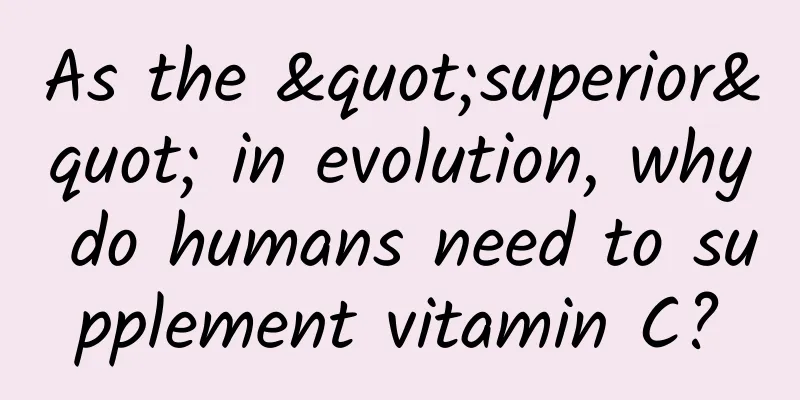As the "superior" in evolution, why do humans need to supplement vitamin C?

|
Eagles fly in the sky, fish swim in the shallows, and all creatures are free in the frosty sky. As a member of the biosphere of nature, although from the perspective of diversity, we often do not emphasize that a certain creature is superior to other creatures. After all, the fittest survive, and each creature that adapts to the environment has its own unique features. However, from the perspective of the entire biosphere, or even the entire ecosystem, we will find that humans, as a single species, are undoubtedly the strongest in the biosphere. In the 4.5 billion years of Earth's history, there has never been a species so powerful and capable of change. Whether it was the birth of life 3.8 billion years ago, the Cambrian explosion, or the Mesozoic era led by reptiles, these great changes were caused by the joint efforts of countless species. Homo sapiens, a species that only appeared 200,000 years ago, has changed the Earth in a short period of time to the point where it is enough to divide a new geological era. So much so that geological experts not only call the era that began with the agricultural era 12,000 years ago the Holocene, but also separate a separate concept from the Holocene - the Anthropocene, to describe this unique era. (Photo source: Internet) It can be said that, to some extent, we are the superior ones in biological evolution, but these superiorities are not without cost. 01. Disappearing Vitamin C In 1497, the Portuguese navigator Vasco da Gama sailed around Africa to India, and the crew members on the ship were seriously ill. The disease caused "body pain, purple spots, swollen and painful gums..." This was the famous scurvy, and more than 100 of the 160 crew members on the ship died. This scene was repeated frequently in the following era of navigation, and even two centuries later, it was still common. Later, Captain Cook of the United Kingdom found a solution, which was to eat a lot of fruits and vegetables on the ship. Of course, you and I know very well today that the core factor behind scurvy is vitamin C, and fruits and vegetables contain a lot of vitamin C. Nowadays, we are used to the existence of this vitamin. After all, vitamin C is a well-deserved "important figure" in various dietary guidelines and nutrient supplements. So, have you ever thought about why humans need to supplement vitamin C? The answer seems simple: humans cannot synthesize vitamin C. However, if you think about it carefully, you will find that this principle is not that simple, because animals are not incapable of synthesizing vitamin C. In fact, our ancestors were able to synthesize vitamin C. Our close relatives, such as lemurs, can synthesize vitamin C [1]. So, when did humans lose the ability to synthesize vitamin C? One theory is that it was 25 million years ago [2]. Vitamin C synthesis requires a key enzyme, LGO. This is also the time when mammals truly stood on the stage of the earth and became the new rulers of the ecological niche. In this new world, our ancestors naturally began to pursue higher evolutionary advantages, including the gradual weakening of the ability to synthesize vitamin C. The disadvantage of the weakening ability to synthesize vitamin C is that we must obtain vitamin C through food, especially fruits and vegetables rich in vitamin C. But other possibilities also emerged. Primates lost their ability to synthesize vitamins at the same time as they lost their ability to break down uric acid [3,4]. If you go to the hospital for a physical checkup, you will know that there is an indicator of uric acid, which cannot be broken down by the human body. Frequent consumption of large amounts of seafood and meat or drinking less water can lead to high uric acid levels! Uric acid is a very important strong reducing agent. The time when the human uricase gene is inactivated is roughly the same as the inactivation of vitamin C. From this perspective, it may partially explain the weakening of the ability to synthesize vitamin C. One of the important functions of vitamin C is anti-oxidation. After primates went through the initial difficult times, the reduction in vitamin C led to an increase in oxidative free radicals in the body. The presence of excessive free radicals increased the possibility of free radical-induced gene mutations, and these mutations ultimately drove ancient humans to emerge from primates [5]. It can be said that the loss of the ability to synthesize vitamin C promoted evolution , and these changes continued to accumulate in the following years until one day, a group of truly "high-IQ" humans appeared in Africa, whom we call "Homo sapiens." 02. More than just vitamin C It's not just vitamin C. In fact, we are unable to synthesize most vitamins. Among the huge family of vitamins, the human body can directly synthesize very few, only vitamin D and a small amount of vitamin K, B12, etc. The rest must rely on food. These vitamins are not dispensable. For example, vitamin E, a fat-soluble vitamin, is the main antioxidant in the human body. When vitamin E is deficient, it may lead to increased oxidative damage to cell membranes and other organs, causing metabolic disorders in the body[6]. In addition, vitamin E itself is a vitamin related to fertility . Vitamin E deficiency may lead to a decrease in male sperm production[7]. For women, vitamin E deficiency may be related to the secretion of estrogen by the ovaries, causing ovarian function regression or premature aging[8]. Therefore, vitamin E is also called tocopherol. However, this important vitamin cannot be synthesized by the human body and must be supplemented through food. Another example is vitamin A , which is a class of biologically active compounds of retinol and has multiple biological functions in the human body. It is not only involved in the normal growth of bones, the functional development and maintenance of vision, but also plays an important role in the reproduction and immune function of animals[9]. In addition, vitamin A also has a corresponding effect on the body's oxidative damage. It can effectively control the oxidative stress response caused by the formation of arachidonic acid in the body due to metabolism, and play an antioxidant role[10]. However, the human body cannot synthesize vitamin A. Vitamin B is a relatively large family, and there are many familiar faces in it, such as vitamin B1, vitamin B2, vitamin B6, vitamin B12, folic acid (B9), niacin (B5), etc. These are names that most people are familiar with, and they are also common dietary supplement ingredients. The reason why they are so common is that B vitamins are involved in the basic process of body metabolism and are important players in the conversion of carbohydrates, fats and proteins into energy supply in the body [11]. For example, the familiar folic acid is vitamin B9, which plays an important role in neurodevelopment and is therefore recommended by many doctors during pregnancy. In fact, B vitamins are generally fast-metabolizing types, so they need to be taken continuously . Faced with the fact that the human body cannot directly synthesize essential vitamins, humans, as omnivorous animals, have many advantages in obtaining food. Especially after we have reached the top of the food chain and developed agriculture, humans can actually supplement various nutrients by enriching their diet. Therefore, most of the time, we don’t have to worry about insufficient vitamins. What really deserves attention is: changes in dietary structure. 03. Diet crisis The dietary crisis here is not that we lack food, but the change in our dietary structure. In human history, especially in the civilized era after the emergence of agriculture, most of the time, the main food of humans was plant food, and these foods are often rich in various nutrients that need to be supplemented, including vitamins and other ingredients, such as various minerals, such as calcium, iron, zinc, selenium , etc., so we are not actually lacking in these nutrients. In recent centuries, especially after the emergence of fertilizers and pesticides, the development of agriculture has been greatly promoted, and the Industrial Revolution has also brought great changes to agricultural development. However, these great changes have brought about changes in the human dietary structure. The food structure of some people has changed from plant-based to meat-based, which will lead to the lack of some nutrients such as vitamins from plants. In addition, some people are very picky eaters, which will also increase their risk of nutrient deficiency... These factors have jointly led to the fact that our dietary structure today is often not very reasonable. (http://www.chyxx.com/research/201607/429709.html) Being irrational has its price. Many of us are still lacking in these vitamins and minerals. These ingredients are essential for the body. The adverse effects of vitamin deficiency have been mentioned above. The lack of mineral elements also has an important impact. For example, calcium, which is familiar to everyone, is not only an important component of our bones, but also a structural substance for cell physiological and biochemical metabolism. If the body lacks calcium, it will lead to fragile bones. Faced with the frequent occurrence of sub-health in modern times, countries have introduced various dietary guidelines in an effort to guide people towards a healthy diet. In fact, why not solve the problem of balanced diet? However, in today's society, people's diet is often limited by many reasons. For example, young people in the workplace can only order takeout for three meals a day, and there are many other reasons that prevent people from eating healthy. Therefore, many people are now facing the problem of insufficient vitamin supplementation, which deserves the attention of people in the fields of nutrition and medicine. With the continuous development of the economy and society, our dietary structure may continue to change in the future. How to advocate a healthy diet and encourage the public to eat rationally has become an issue worthy of deep thought. [1]Marie-Berengere Troadec, Jerry Kaplan, Some Vertebrates Go with the GLO, cell.2008.03.005 [2]Challem J J. Did the loss of endogenous ascorbate propel the evolution of Anthropoidea and Homo sapiens?[J]. Medical hypotheses, 1997, 48(5): 387-392.Goodman M, Porter CA, Czelusniak J, et al. Toward a phylogenetic classification of primates based on DNA evidence complemented by fossil evidence[J]. Molecular phylogenetics and evolution, 1998, 9(3): 585-598. [3]Johnson RJ, Gaucher EA, Sautin YY, et al. The planetary biology of ascorbate and uric acid and their relationship with the epidemic of obesity and cardiovascular disease[J]. Medical hypotheses, 2008, 71(1): 22-31. [4]Wu XW, Lee CC, Muzny DM, et al. Urate oxidase: primary structure and evolutionary implications[J]. Proceedings of the National Academy of Sciences, 1989, 86(23): 9412-9416. [5]Bánhegyi G, Braun L, Csala M, et al. Ascorbate metabolism and its regulation in animals[J]. Free Radical Biology and Medicine, 1997, 23(5): 793-803. [6] Wang, Xiaoyuan, and Peter J. Quinn. "Vitamin E and its function in membranes." Progress in lipid research 38.4 (1999): 309-336. [7 ]Suleiman, S. Ali, et al. "Lipid peroxidation and human sperm motility: protective role of vitamin E." Journal of andrology 17.5 (1996): 530-537. [8 ]Das, Padma, and Mridula Chowdhury. "Vitamin E-deficiency induced changes in ovary and uterus." Molecular and cellular biochemistry 198.1-2 (1999): 151-156. [9]Mora JR, Iwata M, von Andrian UH (September 2008). "Vitamin effects on the immune system: vitamins A and D take center stage". Nature Reviews. Immunology. 8 (9): 685–98. [10.] Jin Lu, Yan Sumei, Shi Binlin, et al. Mechanism of antioxidant function of vitamin A[J]. Journal of Animal Nutrition, 2015, v.27(12):31-36. [11] Depeint, Flore, et al. "Mitochondrial function and toxicity: role of the B vitamin family on mitochondrial energy metabolism." Chemico-biological interactions 163.1-2 (2006): 94-112. |
<<: Probiotic drinks? They sound healthy, but they may just be sugar water!
>>: Tracking at the nanoscale, using AI to play "rock in cells"!
Recommend
Stay away from 11 risk factors that threaten brain health and teach you the "secrets" to keep your brain healthy
Research results recently published in the intern...
What should I do if GuangDianTong and Moments don’t work well?
There are countless channels for information flow...
Tesla fatal crash investigation finds Autopilot not at fault
According to foreign media reports recently, the ...
Activity case: How to conduct fission activities through product thinking?
In the second half of the Internet , the user div...
【WeChat circle assessment period adjustment】V2.0.1
【WeChat circle assessment period adjustment】 V2.0...
October marketing hotspot calendar is freshly released!
October is approaching, and the exciting National...
B station’s precise traffic layout method!
In the past two years, friends who have made shor...
How do technical leaders transform themselves as they advance in entrepreneurship?
[[156060]] When a product is created from scratch...
How can two drops of water and a piece of paper generate electricity for one hour?
In the past few decades, due to the accelerated t...
Poor traffic conversion recently? Share 8 high conversion techniques!
If you were asked to choose between the following...
They are deciphering the "Qinghai-Tibet Code"
As the most unique geological, geographical, reso...
Using 1 gram of lunar soil to find the "secret" of helium-3 extraction
A group photo of the young scientific research te...
Alipay has been revamped again: payment and collection are combined, and travel is included in the "Four Great Kings" for the first time
Your Alipay is about to be upgraded again! On May...
How should an interactive landing page be designed? Teach you some tricks!
September and October are the peak decoration sea...
China's new energy vehicle sales fell 56.4% in Q1 2020, but Tesla's sales in March exceeded 10,000 vehicles
Affected by factors such as the epidemic and the ...









